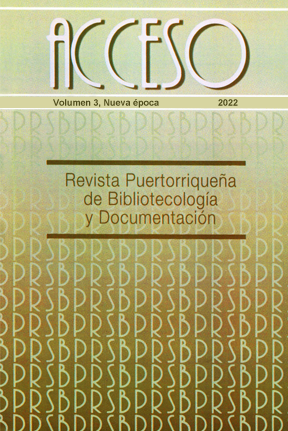Abstract
The decolonization of the library assumes the task of transforming the existing epistemic model, which, incidentally, runs parallel to the modern/colonial epistemology imputed by the mainstream librarianship circuit. The objective of this work is to question the configurations of its cognitive reason and the type of onto-political and methodological dependencies that sustain the work of the library. Decolonization is not justified by itself if there is no mental change. Decolonizing the library is nothing more than producing a new order about its function in the world and the type of epistemological performances suggested. Such a task assumes the reconstruction of the cultural and existential world of humanity as a whole. It is to create tools to prevent the proliferation of various forms of radical exclusion through access and participation in cultural life, in the active exercise of citizenship and in interaction with information, the arts, etc. The paper concludes by observing that sociogenic is key in the restructuring of librarianship.
References
Bal, M. (2021). Lexicón para el análisis cultural. Madrid: Akal.
Banerjee, I. (2014). Mundos convergentes: género, subalternidad y postcolonialidad. La ventana. Revista de estudios de género, 5(39), 07-38. Recuperado en 17 de abril de 2022, de http://www.scielo.org.mx/scielo.php?script=sci_arttext&pid=S1405-94362014000100003&lng=es&tlng=es
Barthes, R. (1972). Mythologies. New York: Hill and Wang,
Elías, G.S. (2017). Caminos zigzagueantes: el humanismo de Frantz Fanon desde la zona de no ser. Araucaria. Revista Iberoamericana de Filosofía, Política y Humanidades, vol. 19, núm. 38. Recuperado el 23 de marzo de 2022 de: https://www.redalyc.org/journal/282/28253016005/html/
Fanon, F. (2001). Piel negra, máscaras blancas. Madrid: Akal.
Gaztambide-Fernández, R. (2012). Decolonization and the pedagogy of solidarity. Decolonization: Indigeneity, Education & Society, Vol. 1, No. 1, 41-67.
Jameson, F. (1991). Postmodernism, or the Cultural Logic of Late Capitalism. Durham, N.C.: Duke University Press.
McLaren, P. (2007). La vida en las escuelas. Una introducción a la pedagogía crítica en los fundamentos en la educación. Buenos Aires: Siglo XXI Editores.
Maturana, H. (1991). El sentido de lo humano. Santiago: Dolmen Ediciones.
Mignolo, W. & Walsh, C. (2018). On descoloniality. Concepts, analytics, praxis. Durham: Duke University Press.
Mohanty, Ch. (2003). Bajo los ojos de Occidente. Academia feminista y discurso colonial. Recuperado el 11 de abril de 2022 de: https://www.feministas.org/IMG/pdf/articulo_libro_descolonizando_el_feminismo-.pdf
Moll, L. Amanti, C. Neff, C. y Gonzalez, N. (1992). Funds of knowledge for reaching: Using a qualitative approach to connect homes and classrooms [Fondos de conocimiento para alcanzar. Usando el enfoque cualitativo para conectar los hogares y salones]. eory into Practice, 32(2), 132-141.
Ocampo, A. (2021). Y-cidad o el acto heurístico-político de la intersección lectura y justicia social. Cuenca: Editorial CES-Al.
Ocampo, A. (2021). Epistemología de la educación inclusiva. Revista Colombiana de Ciencias Sociales, 12 (2), 438-452.
Sandoval, Ch. (2002). Methodology of the opressed. Minessota: University of Minessota Prees.
Sarzuri-Lima, M. (2012). De la palabra al texto: colonialidad lingüística y luchas interculturales. Revista Integra Educativa, 5(1), 59-85. Recuperado en 15 de marzo de 2022 de: http://www.scielo.org.bo/scielo.php?script=sci_arttext&pid=S1997-40432012000100003&lng=es&tlng=es.
Sousa, B. (2009). Una epistemología del sur: la reinvención del conocimiento y la emancipación social. México: Siglo XXI/Clacso.
Sousa, B. (2018). The end of the cognitive empire: the coming of age of epistemologies of the South. Durham: Duke University Press.
Spivak, G. (1998). ¿Puede hablar el subalterno? Recuperado el 23 de julio de 2021 de: https://www.redalyc.org/pdf/1050/105018181010.pdf
Spivak, G. (2012). Una educación estética en la era de la globalización. Buenos Aires: Siglo XXi Editores.
White, H. (1973). METAHISTORIA. La imaginación histórica en la Europa del siglo xix. México: FCE.
Young, I.M. (2002). Justicia y Política de la Diferencia. Valencia: Cátedra.

This work is licensed under a Creative Commons Attribution-NonCommercial-NoDerivatives 4.0 International License.
Copyright (c) 2022 Aldo Ocampo González

